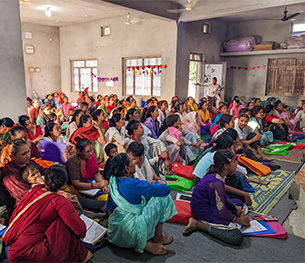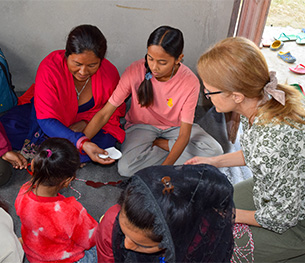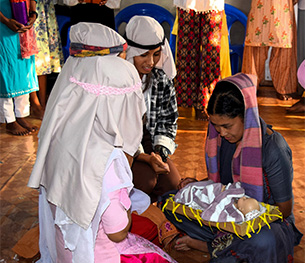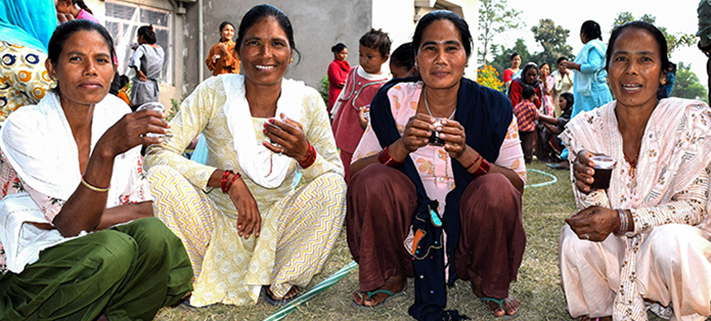Eagerly awaiting the Women’s Workshop

Early on a November morning in South Asia, four women arriving from Thailand carefully stepped along a narrow path between rice paddies to a remote church where over a hundred women had gathered for a workshop. As we neared the church, we could hear the drum beats and songs of praise to our Savior welcoming us in.
We had been preparing for this workshop for about three months. “We” are three WELS missionary wives including Christine Doebler, Linda Marquardt, Mary Witte, and one Friends Network evangelist, Lydia Schultz, all stationed in Chiang Mai, Thailand. Eager to serve our Savior and these women in South Asia, we thoughtfully planned three days of Bible study, crafts and activities centered around the story of Jesus’ birth. We all had varying degrees of experience in cultures different from our own, but none of us had been to this country. So we began the workshop a little unsure of how our plans would be received, but confident that our love for Jesus would shine through.
Having already served on mission fields, we recognized the need for flexibility and teamwork in situations like this. Our carefully planned schedule quickly became a loose guide of things we wanted to do each day. Opening devotions became late morning devotions since the pastors leading these traveled to the church by slow tuk-tuk. There were more women than materials that we had brought, but we had activities where all could participate. Teaching through a translator took some practice and patience. We identified some English speakers who could help bridge the gap of language. Some of us were struggling with sudden family distresses back home. But this only spurred us on in love for the women in front of us.

The women were entranced with the Bible teaching, crafts, and activities. They cut out hearts and hands to represent our love for Jesus and our eagerness to serve him and then strung them up on the walls. The women diligently placed all the pieces of a nativity scene with Velcro fasteners for each day in December before Christmas. After we modeled a pageant of the nativity story, the women giggled and posed as they performed the drama in the roles of Mary, Joseph, shepherds, angels, magi, soldiers and King Herod. By the end of the workshop, the women could easily tell the story of Jesus’ birth to each other using a booklet of pictures. We shared Bible songs in English that we knew and they shared even more beautiful Bible songs in their language for us. We worshiped together, sang together, prayed together, and laughed together. And…there may have been some dancing.
As the days went by, we were amazed by the eagerness of the women to participate, their hunger to learn, and their love and compassion for each other. They spent their days and nights of the workshop in and around the church building, eating and sleeping together, spending time talking, praying together, and caring for each other, especially for the elderly and children. Some of the women had traveled more than six hours by bus from their remote villages to the workshop. This time together with other Christian women was precious to them.
Some women and local pastors shared their testimonies and struggles in coming to Christ and as Christians. We were humbled to hear of the trials they had been through just to be there and confess their Christian faith. The difficulties we faced to get to the workshop – leaving our comfortable homes in Thailand where we can easily share our faith, the long travel of three different flights, cold showers, mosquito nets over our beds, riding over bumpy roads and hiking through the rice paddies – seemed so very small compared to their daily challenges of being a Christian.
We are thankful for this opportunity to share our faith and love of Jesus with these women in South Asia. We look forward to meeting, sharing, laughing, praising God, and maybe dancing with them again someday either in their country or in our heavenly home.
Written by a WELS world missionary wife in Asia.
Subscribe to future Missions Blogs at wels.net/subscribe.
WELS Missions
Learn about the ministry work of WELS Missions.
SUPPORT MISSIONS
Support the ministry work of WELS Missions.

